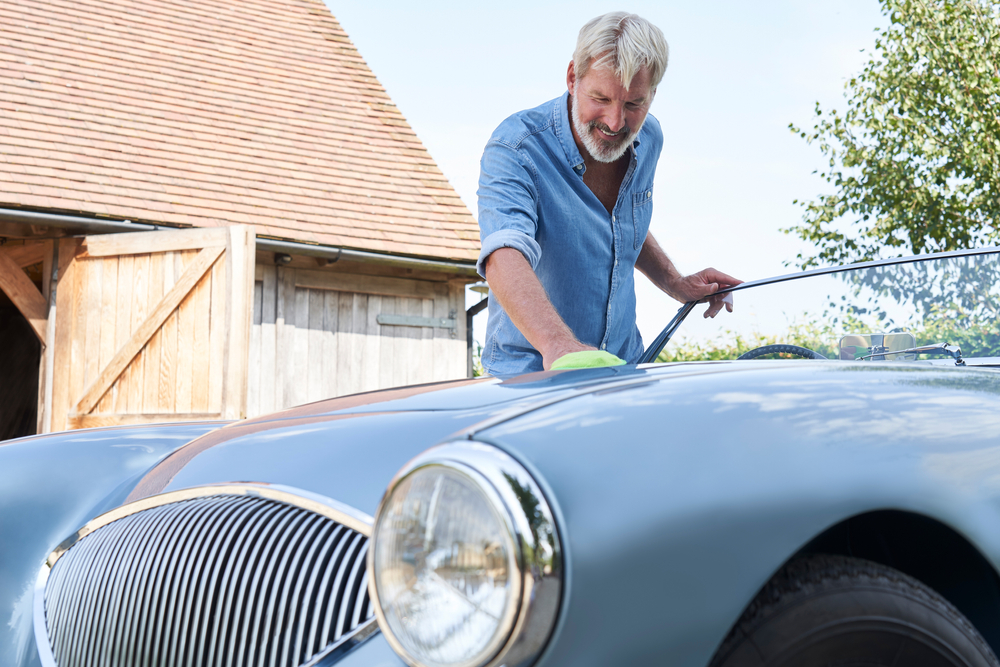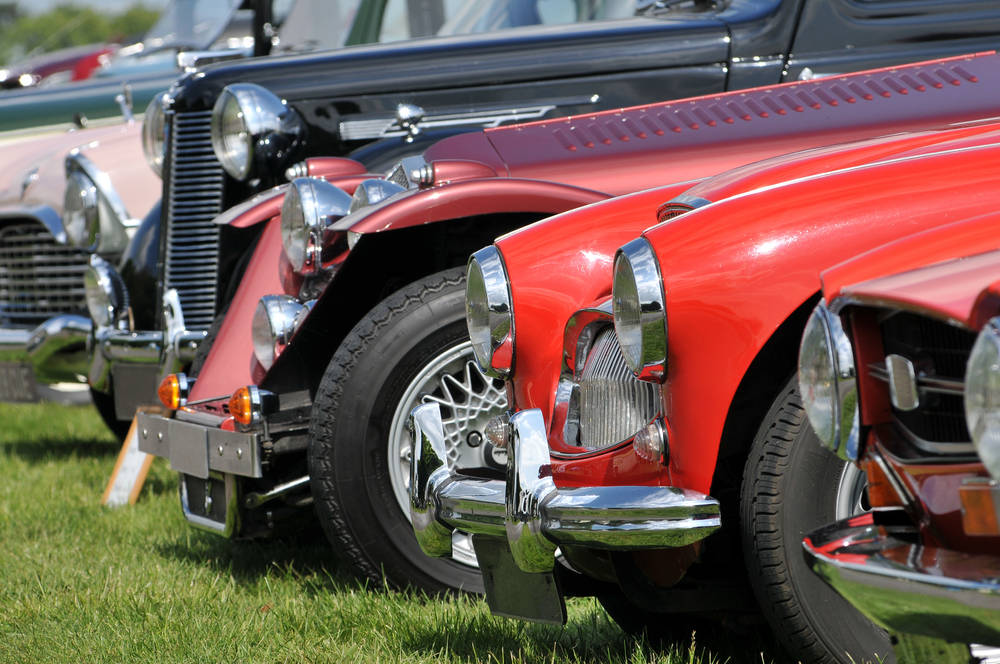If you own a vehicle of certain age, you’re probably wondering how old does a car have to be to be a classic? The truth is, there isn’t a definitive answer, and it depends on who you believe.
For instance, some would argue car tax exemption marks the point at which a car becomes a classic. However, HMRC has an alternative definition, as do many insurance providers who have their own thresholds for qualifying for classic car insurance policies.
In this article, we’ll discuss what constitutes a classic car and how to tell when an old car becomes a classic.
When Does an Old Car Become a Classic Car?
You probably cherish your shiny old banger and love nothing more than a leisurely drive along UK’s windy roads. All well and good, but it doesn’t necessarily make your car a classic, at least not by default.
In the eyes of HMRC, a classic car is anything that’s at least 15 years old and worth a minimum of £15,000.
Others will argue the moment a car becomes exempt from car tax is when it becomes a classic. According to the UK’s Driver and Vehicle Licensing Agency (DVLA) any car that’s 40 years old or more is a historic (classic) vehicle. Even then, classic cars used for trade or business or for hire and reward like wedding rentals are not tax-exempt.
As you can see, what defines a vehicle as a classic car depends on many things. Even classic car insurance providers have different definitions of the meaning of a classic car. Whether or not your car is classed as a classic can have major implications for you and your vehicle in terms of the tax – or Vehicle Excise Duty (VED) – you pay or the benefits you may receive from specialist classic car insurance.
What are the Benefits of Owning a Classic Car?
Aside from being the coolest person in town, there are many benefits that come with owning a classic car. According to the DVLA, there are around 340,000 vehicles over 40 years of age registered in the UK, though around one in eight have been declared off the road by their keepers. If you’re the proud owner of a classic car:
- You’ll be exempt from paying car tax (VED)
- You’ll be exempt from paying the Ultra Low Emissions Zone charge in London.
- You won’t need an annual MOT if no ‘substantial’ changes have been made to your car in the last 30 years.
- You may qualify for classic car insurance which is cheaper than standard car insurance with established providers.
Therefore, if your car is a classic, you could find that you also qualify for a range of financial breaks mentioned above.
What Does Classic Car Tax Exemption Mean?
In line with the DVLA definition of a historic (classic) car, you will be exempt from paying car tax from 1st April 2023 if your vehicle was either built before 1st January 1983, or first registered before 8th January 1983 if you don’t know the build date.
If your car was registered before 1st March 2001 but does not qualify for classic car tax exemption, you’ll pay:
- From £200 vehicle tax a year if the engine is 1,549cc or less.
- From £325 vehicle tax a year if the engine is 1,549cc or more.
Even though classic cars are tax-exempt, they must still be registered in the historic tax class which you can do online, by phone, or at the Post Office.
When is a Classic Car MOT Exempt?
An MOT is a legal requirement for most cars on UK roads. The annual check assesses a car’s roadworthiness and highlights any safety issues that require fixing to obtain an MOT certificate, such as tyre tread depth and exhaust emissions.
While MOTs usually begin on the third anniversary of a car’s registration, the rules are very different for ‘classic’ cars. If your car was manufactured or registered more than 40 years ago, and you haven’t made any substantial changes in the last 30 years, you do not need an MOT. Here, ‘substantial changes’ include replacing the engine, chassis, axles, or body to alter the car’s performance and the way it works.
Even without an MOT, owners must continue to monitor the condition and driveability of their classic car. For instance, if you’re caught driving a classic car in a poor or dangerous condition – with bald tyres, for example – you can be fined up to £2,500 and receive three penalty points on your licence.
What are the Different Categories of Classic Cars?
While HMRC and the DVLA have their own specific definitions of a classic car, motoring experts have been creating additional sub-categories to provide further clarity. These sub-categories can determine your car’s valuation and the cost of your classic car insurance policy.
Thresholds for company car status will vary, but as a general rule the following applies:
| Description | Qualifying Criteria | Examples |
| Veteran | Built before 31st December 1904 | Ford Model A, Rolls-Royce 10HP, Renault Voiturette |
| Edwardian | Built between 1st January 1905 and 31st December 1918 | Ford Model T, Fiat Model 2B, Buick Model D-45 |
| Vintage | Built between 1st January 1919 and 31st December 1930 | Rolls-Royce Phantom, Alfa Romeo RL, Cadillac V-63 |
| Post-vintage | Built between 1st January 1931 and 31st December 1945 | Talbot 65, Morris Eight, Jaguar Mark IV |
| Classic (including modern classic) | Varies, but ranges between 10 and 40 years old, or something that desirable but isn’t made any more | Lotus Elan, Nissan Skyline GT-R, Ford Sierra RS Cosworth, Porsche 911 Turbo, Peugeot 205 GTI |
What Makes a Classic Car Valuable?
Unlike brand new cars that lose value the moment you drive off the forecourt, classic cars often retain their purchase value, and even increase it, as they become more desirable over time.
Research shows there was a 97% increase in average value across a selection of affordable classic cars sold in the UK between 2010 and 2020. For example, the value of an iconic 1961 Volvo P1800 increased by £21,569 over that 10-year period. Similarly, the 1983 Land Rover Defender went up by £15,464.
While age alone isn’t enough to make a car classic, there are a number of characteristics that affect the value of a classic car:
1. Condition
It seems obvious, but the condition of your classic vehicle will help increase its value. In other words, the less restoration works a buyer needs to carry out, the higher the sale price could be. Classic car owners should therefore pay close attention to rust, oil and fluid levels, tyres, battery condition, spark plugs, and other parts that may affect value.
2. Rarity
Rare cars are always likely to command higher price tags than those in plentiful supply. In other words, how many came off the production line, and how many are still around? Rarity doesn’t refer to the age of the vehicle, as some cars from as recent as the 1980s and 1990s are extremely rare and are only likely to increase in value. For instance, a 1987 Ford Sierra Cosworth RS500 sold at auction for £596,250 in 2023.
3. Popularity
The popularity factor of a classic car is another important factor to consider. Even if a car isn’t rare, it may still command a high price if it’s in good condition and still desirable to buyers. That’s because certain cars are considered status symbols due to their iconic design and features, and people want to own them.
4. Restoration Quality
The quality of the restoration work will dictate the asking price if you decide to sell your classic car. Enthusiasts will want to see evidence of original parts being used and proof the car is as close as it can be to the model that first drove off a forecourt all those years ago. However, other buyers may prefer a classic car with modern tech fitted like a satnav or Bluetooth. It all depends on the buyer’s preferences.
What Should I Consider When Taking Out Classic Car Insurance?

As classic car insurance is a specialist area, you should always be upfront with your policy provider and give them all the information they need. This includes:
- Joint valuation: Here, you and your insurance provider will agree on the value of your classic car so that you will be fully reimbursed in the event of an accident, theft, or total loss of the vehicle.
- Modifications: Always make your insurance provider aware of any modification or restoration work that you’ve carried out. If you don’t, you could invalidate your policy or lower the value of your classic car.
- Storage: Where do you keep your classic car overnight? Some providers won’t offer an insurance policy unless the vehicle is stored in a garage with the same postcode as your home or at a secure lock-up.
What if my Classic Car is Laid Up While I Work on it?
Classic cars are often restoration projects that aren’t actually driven by their registered owners. If you’re working on your classic car and are concerned about accidental damage or theft, you can protect your vehicle with insurance cover while it’s off the road, in a garage, or parked on your driveway.
In cases like this, insurance premiums for classic cars are often cheaper than on-road insurance as there’s no requirement for third-party liability while the vehicle is off the road.
Have You Asked Yourself, How Old Does a Car Have to be to be a Classic?
If you’re looking for classic car insurance, Keith Michaels provides robust cover for a wide range of unique and cherished vehicles. So, if you’re the proud owner of a classic car, you’ll want to protect your investment with classic car insurance. Get a quote today.


